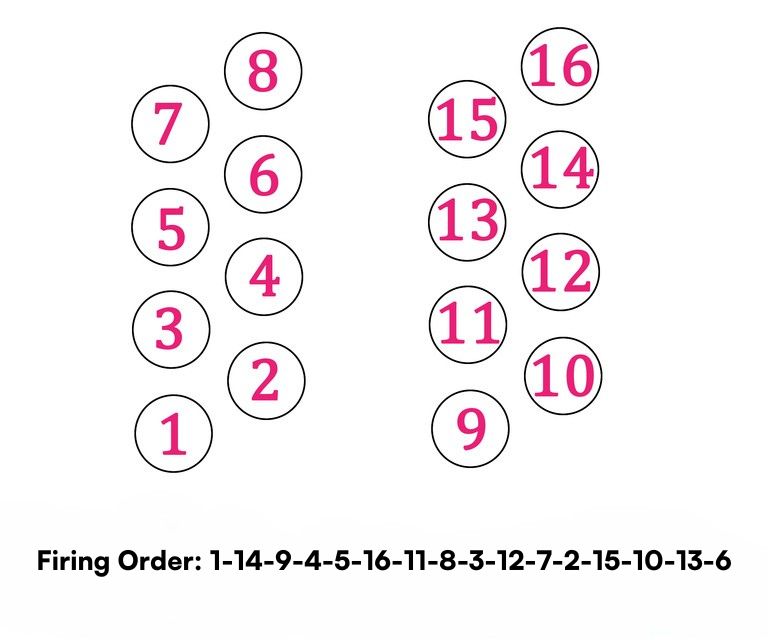
Quick Navigation
W16 Firing Order
Firing Order: 1-14-9-4-5-16-11-8-3-12-7-2-15-10-13-6

What is a Firing Order?
The firing order describes the sequence in which the engine ignites fuel in its cylinders. The W16 engine, with its unique layout, relies on a precise firing order for balance, power delivery, and efficiency.
Understanding the W16 Engine
The W16 engine, built by Bugatti, is a masterpiece of modern automotive engineering. This engine combines the power of 16 cylinders into a compact design.
Key Specifications
- Layout: W-configuration with 16 cylinders
- Displacement: 8.0 liters
- Turbochargers: Quad-turbocharged
- Cylinder Arrangement: Four banks of four cylinders
W16 Firing Order Details
The W16 firing order involves:
- Precise Sequencing: Cylinders ignite in a carefully calibrated order to balance the engine’s immense power.
- Twin V8 Structure: The W16 essentially combines two narrow-angle V8s in a “W” layout.
- Complex Rotation: The crankshaft and camshafts synchronize to handle the firing intervals.
Cylinder Numbering
How Cylinders Are Numbered:
- The W16 uses four banks of four cylinders each.
- Banks 1 and 2 sit on the left, while Banks 3 and 4 sit on the right.
- Cylinders are numbered sequentially:
- Bank 1: 1, 2, 3, 4
- Bank 2: 5, 6, 7, 8
- Bank 3: 9, 10, 11, 12
- Bank 4: 13, 14, 15, 16
Why the Firing Order Matters
The firing order impacts the following:
- Engine Balance: Even cylinder firing minimizes vibrations.
- Power Delivery: Proper sequencing ensures consistent power strokes.
- Cooling Efficiency: Controlled firing reduces thermal hotspots.
- Durability: Correct timing minimizes stress on internal components.
How to Identify the Firing Order
Steps
- Locate the Cylinder Numbers: Use the engine diagram for reference.
- Examine the Crankshaft Design: Understand how the W16 integrates firing sequences across banks.
- Consult Manufacturer Documentation: Verify the exact firing order for your W16 variant.
Symptoms of Incorrect Firing Order
An incorrect firing order results in:
- Misfires: Cylinders fail to ignite properly.
- Power Loss: Uneven strokes disrupt power delivery.
- Engine Vibration: Unbalanced firing causes excessive shaking.
- Mechanical Damage: Stress accumulates on critical components.
- Turbo Lag: Irregular combustion affects turbocharger efficiency.
How to Set the Firing Order
The W16 firing order setup requires precision and expertise.
Tools Required:
- Diagnostic scanner
- Timing light
- Engine service manual
- Specialized torque tools
Steps:
- Disconnect Battery: Avoid accidental sparks.
- Align Crankshaft: Set the crankshaft to the top dead center (TDC) for Cylinder #1.
- Verify Timing Marks: Ensure camshaft alignment matches factory specifications.
- Check Distributor or ECU Settings: Ensure the electronic control unit applies the correct firing sequence.
- Test with Diagnostics: Use tools to confirm proper firing intervals.
Firing Order in Turbocharged Systems
The quad-turbocharged W16 requires precise sequencing to maintain boost efficiency.
Considerations:
- Boost Distribution: The firing order ensures even exhaust pressure across all four turbochargers.
- Lag Reduction: Proper firing minimizes turbo lag.
- Thermal Control: Even firing prevents excessive heat buildup.
Common Challenges
Issues:
- Complexity: The W16’s intricate design requires specialized knowledge.
- Diagnostic Errors: Small misalignments can disrupt performance.
- Heat Management: Incorrect firing exacerbates cooling challenges.
Solutions:
- Follow Manufacturer Guidelines: Adhere strictly to service documentation.
- Use Advanced Diagnostics: Invest in tools designed for high-performance engines.
- Regular Maintenance: Prevent issues by inspecting components regularly.
Benefits of Correct Firing Order
A correct firing order ensures:
- Maximum Performance: Optimal combustion translates to unparalleled speed and acceleration.
- Reliability: Reduces wear and tear on engine components.
- Fuel Efficiency: Precise firing optimizes air-fuel mixture usage.
- Turbocharger Longevity: Maintains consistent exhaust pressure for quad-turbo reliability.
Frequently Asked Questions
Can I change the W16 firing order?
No, the firing order is determined by the engine’s design and crankshaft configuration. Altering it would require re-engineering the entire engine.
What tools ensure accurate firing order alignment?
Advanced diagnostic scanners and timing lights are essential. For the W16, Bugatti-specific tools are often required.
How does the W16 firing order differ from a standard V8?
The W16 uses a complex sequence (1-14-9-4-5-16-11-8-3-12-7-2-15-10-13-6) to balance its unique quad-bank layout. A V8 typically follows a simpler sequence like 1-8-4-3-6-5-7-2.
Conclusion
The W16 firing order is a critical aspect of its exceptional performance. Understanding and applying the correct sequence ensures smooth operation, maximum power, and reliability. For anyone working with or learning about the W16 engine, mastering the firing order is non-negotiable. With this guide, you can approach this complex subject with confidence and precision.

